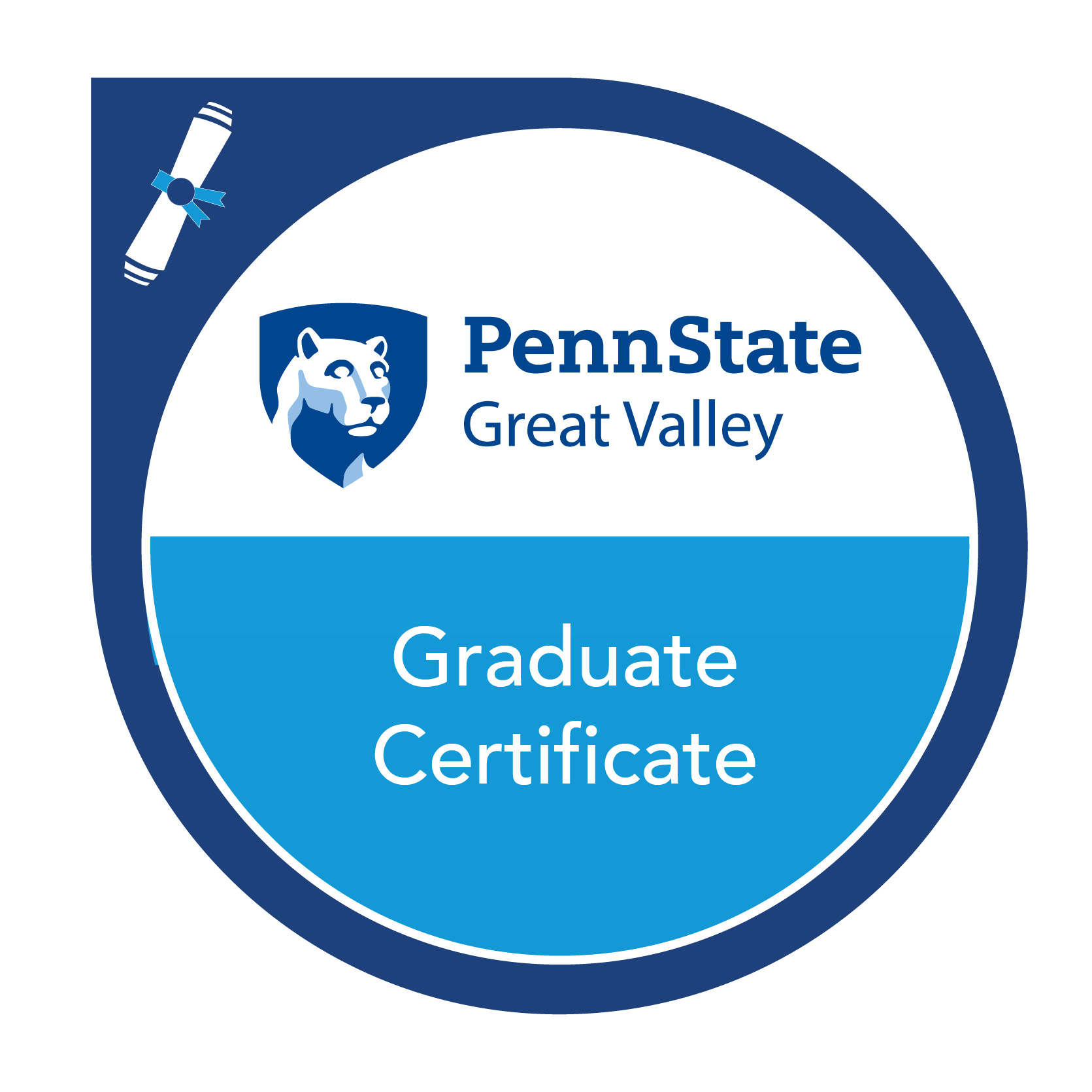100% Online
Complete your Penn State course work at your own pace and 100% online.
Application deadline
Credits and costs
Stackable Credentials
This program is embedded within the Master of Software Engineering credential.
Gain Skills to Prepare for a Career in AI
Create AI–based solutions for a variety of applications and industries.
Leverage machine learning and natural language processing.
Use cutting-edge deep learning techniques in AI modeling.
Program in Python and its toolkits.
AI Engineering Online Courses
AI Engineering Online Courses
As a graduate of this software engineering certificate program, you can demonstrate competency in the following foundational areas of artificial intelligence:
- deep learning and neural networks
- machine learning
- natural language processing
- search and planning
- agent systems
- 3credits
This course will cover the foundations on neural networks and deep learning networks. It covers the core concepts of deep neural networks, including the convolutional neural networks for image recognition, recurrent neural networks for sequence generation, and generative adversarial networks for image generation.
- Prerequisite
STAT 500
- 3credits
This course covers basic as well as advanced concepts to gain a detailed understanding of Natural Language Processing tasks such as language modeling, text to speech generation, natural language understanding, and natural language generation. Students can learn the necessary skills to design a range of applications, including sentiment analysis, translating between languages, and answering questions. The practical implementation of these applications with deep neural networks is also discussed.
- Prerequisite
STAT500 and A-I 570 or DAAN 570
- 3credits
This course will teach the foundations of AI and give students a practical understanding of the field. This course gives an overview of the core concepts of AI, including the intelligent agents, knowledge and reasoning, reinforcement learning, planning and acting, belief networks, computational learning, Markov decision process, and more.
- 3credits
This course will explore the development of analytics systems and the application of best practices and established software design principles using the Python programming language and its several toolkits.
Using Certificate Credits toward a Stackable Credentials Degree Pathway
As part of the stackable pathway, the courses required for this 12-credit certificate can also be applied to a Master of Software Engineering if you apply and are accepted into the program. If you have been accepted into this certificate program, you will not be charged an additional fee to apply for the Master of Software Engineering program.
Courses may also apply to other degree programs. Students should contact their adviser to discuss transfer credit policies and application fees and details.
Course Availability
If you're ready to see when your courses will be offered, visit our public LionPATH course search (opens in new window) to start planning ahead.
Start or Advance Your Career

Start or Advance Your Career
You can use the knowledge gained from this online graduate certificate program and the support of Penn State career resources to pursue careers in a variety of software engineering fields, depending on your goals.
Career Services to Set You Up for Success

From the day you're accepted as a student, you can access resources and tools provided by Penn State World Campus Career Services to further your career. These resources are beneficial whether you're searching for a job or advancing in an established career.
- Opportunities to connect with employers
- Career counselor/coach support
- Occupation and salary information
- Internships
- Graduate school resources
Ready to Learn More?
Get the resources you need to make informed decisions about your education. Request information on this program and other programs of interest by completing this form.
Ready to take the next step toward your Penn State graduate certificate?
Costs and Financial Aid
Costs and Financial Aid
Learn about this program's tuition, fees, scholarship opportunities, grants, payment options, and military benefits.
Costs and Financial Aid
Graduate Tuition
Graduate tuition is calculated based on the number of credits for which you register. Tuition is due shortly after each semester begins and rates are assessed every semester of enrollment.
2025–26 Academic Year Rates
| How many credits do you plan to take per semester? | Cost |
|---|---|
| 11 or fewer | $1,037 per credit |
| 12 or more | $12,448 per semester |
2026–27 Academic Year Rates
| How many credits do you plan to take per semester? | Cost |
|---|---|
| 11 or fewer | $1,048 per credit |
| 12 or more | $12,572 per semester |
Paying for Your Certificate
Students pursuing a certificate are considered "nondegree," a status that is not eligible for federal student aid, including the Federal Direct Stafford Loan program. A private alternative loan may be an option to consider.
Additionally, Penn State offers many ways to pay for your education, including an installment plan and third-party payments. Penn State World Campus also offers an Employer Reimbursement and Tuition Deferment Plan. Learn more about the options for paying for your education.
Students pursuing a degree and meeting all other eligibility requirements may qualify for financial aid.
Technical Requirements
Review the technical requirements for this program.
Military Benefits
Military service members, veterans, and their spouses or dependents should explore these potential military education benefits and financial aid opportunities, as well.
Additional Cost of Attendance Details
To view the detailed list of cost of attendance elements:
- visit the Tuition Information site
- click the plus sign to expand the table
- select a semester from the World Campus row
Earn Stackable Credentials on the Way to a Master's Degree

Earn Stackable Credentials on the Way to a Master's Degree
This certificate can serve as a stand-alone credential and as a step on your journey toward a Master of Software Engineering. Stackable credentials recognize your new skills and knowledge while you work toward your master's degree — with no additional application fees.
Earning graduate certificates from Penn State World Campus is a great way to gain new skills and quickly add valuable credentials to your résumé.
This graduate certificate’s courses satisfy requirements toward the following degree(s):
Learn cutting-edge approaches to creating, maintaining, and improving software systems. This cohort-based online master's program mimics the remote-workplace environment often found in the global marketplace.
Learn more about the Master of Software EngineeringShow Your Progress with a Digital Badge
Show Your Progress with a Digital Badge
Upon completion of this program, Penn State awards you a graduate certificate and a digital badge from Credly.

Certificate earners are awarded a digital badge for each certificate they complete as part of this stackable credentials group. Badges can be displayed digitally to recognize your accomplishment of attaining a new level of knowledge.
Who Should Apply?
This program is designed to help students with an undergraduate degree in computer science, computer engineering, electrical engineering, or information sciences prepare to succeed as an AI or machine learning engineer, roles that make use of AI, machine learning, deep learning, and programming.
Set Your Own Pace

Whether you are looking to finish your program as quickly as possible or balance your studies with your busy life, Penn State World Campus can help you achieve your education goals. Many students take one or two courses per semester.
Convenient Online Format
This program's convenient online format gives you the flexibility you need to study around your busy schedule. You can skip the lengthy commute without sacrificing the quality of your education and prepare yourself for more rewarding career opportunities without leaving your home.
A Trusted Leader in Online Education

Penn State has a history of more than 100 years of distance education, and World Campus has been a leader in online learning for more than two decades. Our online learning environment offers the same quality education that our students experience on campus.
Information for Military and Veterans

Are you a member of the military, a veteran, or a military spouse? Please visit our military website for additional information regarding financial aid, transfer credits, and application instructions.
How to Apply to Penn State

How to Apply to Penn State
Apply by November 20 to start January 12
Application Instructions
Deadlines and Important Dates
Complete your application and submit all required materials by the appropriate deadline. Your deadline will depend on the semester you plan to start your courses.
Spring Deadline
Apply by November 20 to start January 12Summer Deadline
Apply by April 20, 2026, to start May 18, 2026Fall Deadline
Apply by July 20, 2026, to start August 24, 2026
Steps to Apply
For admission to the J. Jeffrey and Ann Marie Fox Graduate School, an applicant must hold either (1) a baccalaureate degree from a regionally accredited U.S. institution or (2) a tertiary (postsecondary) degree that is deemed comparable to a four-year bachelor's degree from a regionally accredited U.S. institution. This degree must be from an officially recognized degree-granting institution in the country in which it operates.
Students should hold a bachelor's degree in computer science, engineering, or mathematics to be considered for admission to the program. Students from other disciplines will be considered based on prior course work (including the entrance requirements for mathematics and programming) and standardized test scores. Students should have earned at least a 3.00 junior/senior GPA (on a 4.00 scale) in their baccalaureate program.
Mathematics Requirement
Applicants must complete Calculus I (equivalent to Penn State's MATH 140), 1 semester of probability or statistics, and 1 semester of linear algebra.
Programming Requirement
Applicants must complete two introductory-level programming courses where both courses used the same language. If an applicant believes his/her work experience satisfies the background, he/she should include a recommendation letter from a technical colleague describing the applicant’s coding contributions at work.
You will need to upload the following items as part of your application:
Official transcripts from each institution attended, regardless of the number of credits or semesters completed. Transcripts not in English must be accompanied by a certified translation. If you are a Penn State alumni, you do not need to request transcripts for credits earned at Penn State but must list Penn State as part of your academic history.
Test Scores — GRE/GMAT scores are not required and will not be reviewed.
English Proficiency — The language of instruction at Penn State is English. With some exceptions, international applicants must take and submit scores for the Test of English as a Foreign Language (TOEFL) or International English Language Testing System (IELTS). Minimum test scores and exceptions are found in the English Proficiency section on the Fox Graduate School's "Requirements for Graduate Admission" page. Visit the TOEFL website for testing information. Penn State's institutional code is 2660.
To begin the online application, you will need a Penn State account.
Create a New Penn State Account
If you have any problems during this process, contact an admissions counselor at [email protected].
Please note: Former Penn State students may not need to complete the admissions application or create a new Penn State account. Please visit our Returning Students page for instructions.
Stackable Credentials Application Fee Waiver
If you have been previously accepted to a program with stackable credentials, you will not be charged an additional application fee for any associated programs.
Associated programs in the software engineering stack:
Certificates
- Graduate Certificate in AI Engineering
- Graduate Certificate in Data Analytics and Engineering
- Graduate Certificate in Project Quality Management
- Graduate Certificate in Software Architecture and Design
Degree
- Master of Software Engineering
If you begin with a certificate and are interested in pursuing the Master of Software Engineering, work with your adviser while completing your first certificate to determine which program to apply to next.
Up to 15 credits earned in any of these certificate programs may be transferred to the master's degree in software engineering, subject to restrictions outlined in GCAC-309 Transfer Credit.
You can begin your online application at any time. Your progress within the online application system will be saved as you go, allowing you to return at any point as you gather additional information and required materials.
- Choose Enrollment Type: "Certificate Admission"
- Choose "WORLD CAMPUS" as the campus
Checking Your Status
You can check the status of your application by using the same login information established for the online application form.6. Complete the application.
Admissions Help
If you have questions about the admissions process, contact an admissions counselor at [email protected].
Current Penn State students should contact [email protected] with questions and for assistance.
Contact Us

Contact Us
Have questions or want more information? We're happy to talk.
For general questions about the program:
Dr. Amanda Neill
[email protected]
For general questions about Penn State World Campus:
World Campus Admissions Counselors
Phone: 814-863-5386
[email protected]
Learn from the Best
Learn from the Best
The Graduate Certificate in AI Engineering is offered in partnership with the Penn State Great Valley School of Graduate Professional Studies.
Faculty
Adrian S. Barb
- DegreePh.D., Computer Science, University of Missouri
- DegreeMBA, Finance and Management Information Systems, University of Missouri
- DegreeB.S., Industrial Engineering, University of Bucharest
Dr. Adrian S. Barb, associate professor of information science, teaches databases, data mining, and big data courses. He has worked as a database programmer analyst as well as a web developer at University of Missouri. His research interests include data mining, knowledge discovery in databases, knowledge representation and exchange in content-based retrieval systems, semantic modeling and retrieval, conceptual change, ontology integration, and expert-in-the-loop knowledge generation and exchange.
Mohamad Darayi
- DegreePh.D., Industrial and Systems Engineering, University of Oklahoma
- DegreeM.S., Industrial Engineering, Tarbiat Modares University
- DegreeB.S., Industrial Engineering, University of Tabriz
Dr. Mohamad Darayi, assistant professor of systems engineering, focuses his principal research and key publications on infrastructure network resilience and simulation modeling applications in health care, manufacturing, and supply chain management. He teaches courses in system simulation, risk analysis, network modeling, and data analytics.
Joanna F. DeFranco
- DegreePh.D., Computer and Information Science, New Jersey Institute of Technology
- DegreeM.S., Computer Engineering, Villanova University
- DegreeB.S., Electrical Engineering and Math, Penn State
Dr. Joanna F. DeFranco is an assistant professor of software engineering. She has worked as an electronics engineer for the Navy and as a software engineer at Motorola. Her research interests include software engineering teams, effective teamwork, Internet of Things, and software-intensive critical systems.
Everton Tavares Guimaraes
- DegreePh.D., Software Engineering, Pontifical Catholic University of Rio de Janeiro
- DegreeM. S., Computing and Systems, Federal University of Rio Grande do Norte
- DegreeB.S., Information Technology, Federal Institute of Education, Science, and Technology
Everton Tavares Guimaraes is an assistant professor specializing in software engineering. He teaches algorithms, programming, software development, architecture, and mobile computing. For a decade, he has partnered with companies domestically and internationally. His research focuses on empirical software engineering, software quality (e.g., maintenance and evolution), technical debt, AI techniques, and mobile software engineering.
Phillip A. Laplante
- DegreePh.D., Computer Science, Stevens Institute of Technology
- DegreeM.B.A., University of Colorado
- DegreeM.Eng., Electrical Engineering, Stevens Institute of Technology
- DegreeB.S., Systems Planning and Management, Stevens Institute of Technology
Dr. Phillip A. Laplante, professor of software and systems engineering, pioneered the area of real-time image processing, co-founding the first journal and publishing the first two texts on the subject. For these achievements, he was named a Fellow of SPIE. In AI, he has investigated uncertain information processing using fuzzy sets and rough set theory and, more recently, has focused on the use of AI in safety-critical systems. He holds an appointment as a computer scientist in the Secure Systems and Applications group at the National Institute of Standards and Technology (NIST), working on the IoT, blockchain, and related technologies.
Colin Neill
- DegreePh.D., Software and Systems Engineering, University of Wales Swansea
- DegreeM.Sc., Communications Systems, University of Wales Swansea
- DegreeB.Eng., Electrical Engineering, University of Wales Swansea
Dr. Colin Neill is a professor of software engineering and systems engineering. He teaches many courses in software and systems engineering and project management. He is the author of more than 80 articles on the development and evolution of complex software and systems and their management and governance. Dr. Neill is a senior member of the IEEE and a member of INCOSE, and he serves as associate editor-in-chief of Innovations in Systems and Software Engineering.
Robin G. Qiu
- DegreePh.D., Industrial Engineering, Penn State
- DegreePh.D., (Minor), Computer Science, Penn State
- DegreeM.S., Numerical Control, Beijing Institute of Technology, China
- DegreeB.S., Mechanical Engineering, Beijing Institute of Technology, China
Dr. Robin G. Qiu is a professor of information science. He teaches courses on data analytics, information science, software engineering, and cyber security. His research includes data and computational sciences, health-care analytics, smart service systems (health care, city mobility, energy efficiency, IoT, etc.), blockchain, and cybersecurity analytics. He served as the editor-in-chief of INFORMS Service Science and as an associate editor of IEEE Transactions on Systems, Man, and Cybernetics and IEEE Transactions on Industrial Informatics and has more than 170 publications.
Dusan Ramljak
- DegreePh.D., Computer and Information Sciences, CST, Temple University
- DegreeM.Sc. and B.Sc., Electrical Engineering - Systems Control, University of Belgrade, Serbia
Dr. Dusan Ramljak, assistant teaching professor of information science, teaches courses on information science, data science, storage systems, and emerging technologies. He has been applying data science on storage systems in NSF IUCRC projects with HPE, Dell, Huawei, and other companies and has more than 20 years of system administration experience facilitating business and research in the U.S., Portugal, and Serbia. His research interests include solving challenging storage systems, provenance, and caching problems, and developing and integrating distributed and parallel data mining and statistical learning technology for an efficient knowledge discovery at large sequence and temporal databases.
Sally Sue Richmond
- DegreeM.S., Information Science, Penn State
- DegreeB.A., Art, Penn State
Sally Sue Richmond is an instructor in information science. She worked as an IT professional for more than 20 years prior to teaching. Her research interests include human-computer interaction, engineering education, and teams.
Raghvinder S. Sangwan
- DegreePh.D., Computer and Information Sciences, Temple University
- DegreeM.S., Computer Science, West Chester University
- DegreeB.S., Genetics and Plant Breeding, Haryana Agricultural University
Dr. Raghvinder S. Sangwan is a professor of software engineering and director of the Big Data Lab — a research collaborative focused on data science and artificial intelligence and their applications. His own research in this space focuses on network analytics approaches to large-scale complex systems, explainable AI, and the design of secure AI systems.
Satish M. Srinivasan
- DegreePh.D., Information Technology, University of Nebraska at Omaha
- DegreeM.S., Industrial Engineering and Management, Indian Institute of Technology, Kharagpur
- DegreeB.S., Information Technology, Bharathidasan University
Dr. Satish Srinivasan is an associate professor of information science. He teaches courses in data retrieval, processing, storage, and mining; predictive and prescriptive analytics; and the application of analytics to particular domains, including cybersecurity and sport. His research interests include natural language processing and text mining of social media; network analytics techniques to determine critical elements in large-scale networks; and the application of machine learning to bioinformatics and genomics.
Chengfei Wang
- DegreePh.D., Computer Science, Auburn University
- DegreeM.S., Computer Science, Auburn University
- DegreeM.S., Biophysics, University of Electronic Science and Technology of China
- DegreeB.S., Biotechnology, University of Electronic Science and Technology of China
Dr. Chengfei Wang is an assistant professor of artificial intelligence. He teaches courses in foundations of AI and analytics programming in Python. His research interests include the robustness problem of deep learning models applied in life-critical missions and business intelligence based on natural language analysis of customer reviews on social media. His research on the robustness of the computer vision model was published at top-tier AI conference Computer Vision and Pattern Recognition (CVPR) Conference.
